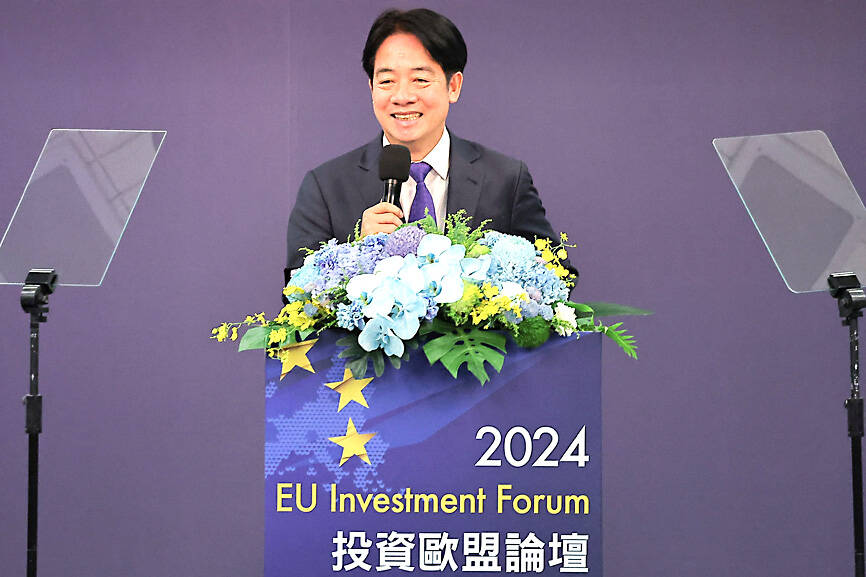President William Lai (賴清德) yesterday called for the signing of an economic partnership agreement with the EU, saying it would boost cooperation in semiconductors and that, as democracies, the two sides should be working together.
Taiwan has pushed for the signing of investment and trade deals with the EU, in what would be politically significant for Taiwan given its diplomatic isolation and general exclusion from most global bodies and agreements.
For its part, the EU has been courting Taiwan as a “like-minded” partner under the European Chips Act to encourage more semiconductor production in Europe and lessen dependence on Asia, despite the lack of formal ties.

Photo: Ann Wang, Reuters
Speaking at the annual EU investment forum in Taipei, Lai said that facing the threat of expanding authoritarianism, Taiwan and the EU must form a “strong democratic umbrella” and build secure supply chains for global democracies.
“Looking to the future, Taiwan hopes to take an innovative approach toward the signing of an economic partnership agreement with the EU,” he said.
Such an agreement would lay a sound institutional basis for further cooperation in fields such as semiconductors and artificial intelligence, he added.
“This would not only make both our economies more resilient and secure, but also ensure the stable operation of global supply chains,” he said.
Taiwanese investment in the EU has been anchored by Taiwan Semiconductor Manufacturing Co (TSMC, 台積電), which in August broke ground on a major new chip plant in Dresden, Germany, expected to be a key supplier to European industry and automakers.
Maria Martin-Prat, deputy head of the European Commission’s directorate-general for trade, made no mention of signing such a deal with Taiwan in a video message to the investment event, although she did praise bilateral relations.
“Taiwan, a vibrant democracy with an open economy, is a trusted partner for us to promote our economic security,” she said.
Taiwan has few free-trade agreements, although last year it signed an Enhanced Trade Partnership with the UK and has applied to join the Comprehensive and Progressive Agreement for Trans-Pacific Partnership.

A magnitude 7.0 earthquake struck off Yilan at 11:05pm yesterday, the Central Weather Administration (CWA) said. The epicenter was located at sea, about 32.3km east of Yilan County Hall, at a depth of 72.8km, CWA data showed There were no immediate reports of damage. The intensity of the quake, which gauges the actual effect of a seismic event, measured 4 in Yilan County area on Taiwan’s seven-tier intensity scale, the data showed. It measured 4 in other parts of eastern, northern and central Taiwan as well as Tainan, and 3 in Kaohsiung and Pingtung County, and 2 in Lienchiang and Penghu counties and 1

A car bomb killed a senior Russian general in southern Moscow yesterday morning, the latest high-profile army figure to be blown up in a blast that came just hours after Russian and Ukrainian delegates held separate talks in Miami on a plan to end the war. Kyiv has not commented on the incident, but Russian investigators said they were probing whether the blast was “linked” to “Ukrainian special forces.” The attack was similar to other assassinations of generals and pro-war figures that have either been claimed, or are widely believed to have been orchestrated, by Ukraine. Russian Lieutenant General Fanil Sarvarov, 56, head

FOREIGN INTERFERENCE: Beijing would likely intensify public opinion warfare in next year’s local elections to prevent Lai from getting re-elected, the ‘Yomiuri Shimbun’ said Internal documents from a Chinese artificial intelligence (AI) company indicated that China has been using the technology to intervene in foreign elections, including propaganda targeting Taiwan’s local elections next year and presidential elections in 2028, a Japanese newspaper reported yesterday. The Institute of National Security of Vanderbilt University obtained nearly 400 pages of documents from GoLaxy, a company with ties to the Chinese government, and found evidence that it had apparently deployed sophisticated, AI-driven propaganda campaigns in Hong Kong and Taiwan to shape public opinion, the Yomiuri Shimbun reported. GoLaxy provides insights, situation analysis and public opinion-shaping technology by conducting network surveillance

‘POLITICAL GAME’: DPP lawmakers said the motion would not meet the legislative threshold needed, and accused the KMT and the TPP of trivializing the Constitution The Legislative Yuan yesterday approved a motion to initiate impeachment proceedings against President William Lai (賴清德), saying he had undermined Taiwan’s constitutional order and democracy. The motion was approved 61-50 by lawmakers from the main opposition Chinese Nationalist Party (KMT) and the smaller Taiwan People’s Party (TPP), who together hold a legislative majority. Under the motion, a roll call vote for impeachment would be held on May 19 next year, after various hearings are held and Lai is given the chance to defend himself. The move came after Lai on Monday last week did not promulgate an amendment passed by the legislature that